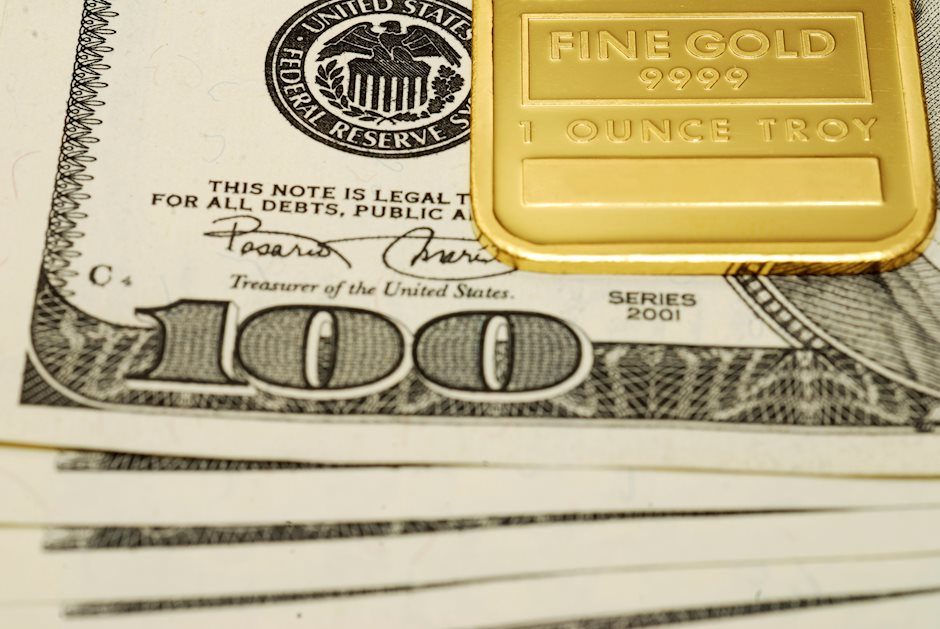Gold Price Forecast: XAU/USD steadies around $1,990 with eyes on Ukraine, US inflation
- Spot gold prices reversed sharply lower from above $2050 to under $2000 on Wednesday, dropping nearly 3.0% on the day.
- A historic pullback in energy prices (and other commodities) saw inflation expectations fall, weighing on the demand for gold.

Update: Gold (XAU/USD) bears take a breather around $1,990 during the initial Asian session on Thursday, after posting the biggest daily fall in 14 months.
The metal’s previous decline could be linked to the concerns that Ukraine’s diplomacy may help overcome the geopolitical tussle with Russia. However, the latest headlines from Russia and the White House suggest that the noise remains on the table, at least from Moscow’s side, which in turn probed the gold sellers.
While portraying the mood, Wall Street and the US Treasury yields both rallied the previous day but the S&P 500 Futures fail to copy the moves of late.
In addition to the market’s anxiety ahead of the Moscow-Kyiv talks in Turkey, the monthly print of the US Consumer Price Index (CPI) for February and the monetary policy meeting of the European Central Bank (ECB) also keep XAU/USD traders on the edge.
Read: US February CPI Preview: Will hot inflation force Fed’s hand?
It’s worth noting that the US inflation expectations, as per the 10-year breakeven inflation rate per the St. Louis Federal Reserve (FRED) data, refreshed record top to 2.9% before stepping back to 2.84% by the end of Wednesday’s North American trading session.
End of update.
A historic pullback in energy prices from multi-year highs amid a barrage of bearish headlines including the UAE and Iraq talking about pushing OPEC to increase output and further oil reserve releases by the US and its allies has seen market-based measures of inflation expectations fall and thus demand for inflation protection in the form of precious metals ease. US 10-year break-even inflation expectations pulled back to 2.86% from closer to 2.93% on Tuesday, pulling spot gold (XAU/USD) prices back from Asia Pacific session highs above $2050 per troy ounce to back under $2000. At current levels in the mid-$1990s, gold is set for an on-the-day decline of roughly 2.7%, its worst one-day performance since January 2021.
The prospect of higher OPEC output, of more crude oil reserve releases, and of potentially higher exports from Iran and Venezuela if the US can deal make effectively may be enough to take the wind out of the oil rally in the short term. That might help to ease acute stagflation fears which have been so supportive of the precious metals complex recently. But meaningful reprieve from high energy (and other Russia-linked commodities) prices can only come if the Russo-Ukrainian war and Western sanctions come to an end.
Hopes that a ceasefire might be in the offing when the Russian and Ukrainian Foreign Ministers meet in Turkey on Thursday amid more conciliatory rhetoric from both sides regarding a potential agreement in recent days supported risk appetite on Wednesday and was another factor weighing on gold. But geopolitical strategists for the most part do not see the talks yielding a ceasefire. Somewhat cynically, some think Russian President Vladimir Putin might be using the talks as a distraction as Russian troops regroup to up the ferocity of their assault on major Ukrainian cities like Kyiv.
Even if the best-case scenario on Thursday does come into fruition and the two sides reach a ceasefire, the sharp resultant gold downside (XAU/USD could drop all the way back to the low $1900s) likely won’t prove long-lasting. Western sanctions on Russia won’t just magically disappear. The West will continue to view Russia as a pariah state and continue with efforts to isolate and decouple from its economy. That means short-term Russia-related supply concerns likely aren’t going to abate anytime soon, no matter what happens regarding the war in Ukraine.
Another key event for traders to keep an eye on this coming Thursday is US Consumer Price Inflation figures for February. Headline CPI is seen nearing 8.0%. While this will solidify expectations for a 25bps rate hike from the Fed later in the month and for a series of subsequent rate hikes back towards neutral (i.e. about 2.0%), the prospect of near-term real rates (interest rates minus headline YoY CPI) turning positive any time soon remains slim. Indeed, the latest geopolitical events and subsequent commodity price move ensure that MoM inflation rates will only accelerate in the months ahead, keeping the YoY rate elevated at higher levels for longer. Until the Fed gets serious about tackling inflation (i.e. moving short-term rates about the YoY inflation rate), gold remains an attractive asset to hold.
Author

Joel Frank
Independent Analyst
Joel Frank is an economics graduate from the University of Birmingham and has worked as a full-time financial market analyst since 2018, specialising in the coverage of how developments in the global economy impact financial asset

















